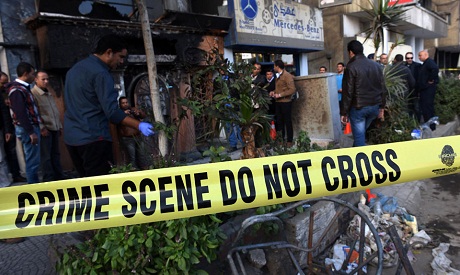
People and investigators gather at the scene of a petrol bomb attack on a Cairo disco in the Agouza neighbourhood of the Egyptian capital's Giza district on December 4, 2015 (Photo: AFP)
A Molotov cocktail hurled at a Cairo restaurant and bar killed 16 people on Friday as an altercation developed into an arson attack, an incident that apparently was not motivated by terrorism.
"Two people were accidently injured while firefighters were putting out the blaze," health ministry spokesperson Khaled Megahed told Ahram Online. "One was treated on scene and the other was sent to the police hospital. His situation is stable."
Investigations conducted by prosecution revealed that the prime perpetrators were two young men who were denied entry by the club's security personnel at the door.
The duo left then came back to the club, named Al-Sayyad, with a Molotov cocktail. They picked a fight with the door security and then threw the firebomb at the club before fleeing the scene.
Club manager Hassan Ramadan was quoted as saying by Ahram Arabic website that the pair came back with three other individuals at 6AM CMT while the employees were closing the club.
"They threw Molotov cocktail at the entrance; the fire prevented people inside from leaving," he said.
All victims, 11 men and five women, were employees of the club, Ramadan added.
The prosecution ordered that the victims' bodies be transferred to the Zeinhom morgue for DNA tests, as some of them cannot be indentified due to severe burns.
Nasr Tawfik, manager of Bolak El-Dakrour hospital, which received three bodies, told Ahram Arabic website that most of the victims died due to suffocation.
Nine bodies were at Agouza public hospital, which saw the arrival of some of their devastated family members.
Security forces arrested two suspects, while three others remain at large.
Al-Sayyad's floor and walls turned black after the fire. The place was sealed with a yellow sign reading "crime scene do not cross." The door still stands, but is tinged with black, in the middle of a facade that was partly damaged.
The upper part of the facade turned coal black, with the paint singed off the rest of it.
The attack was initially thought to be an act of terrorism, as Islamist militants have claimed responsibility for a number of bombings and shootings in Egypt, mostly in North Sinai, which have targeted security forces over the past two years.
Islamist militancy has spiked since the 2013 ouster of Islamist president Mohamed Morsi.
Short link: